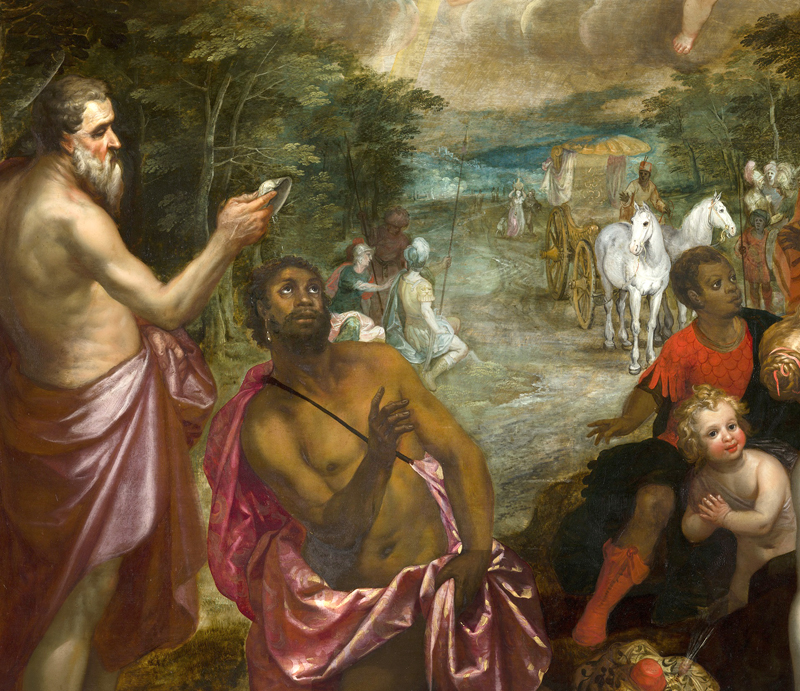
Baptism of the Chamberlain
of Queen Candace of Ethiopia, detail
Hendrik van Balen & Jan Brueghel, ca. 1625-1630
My dear friends,
Today, as we reflect on the scripture from Acts 8:26-40, let us explore the profound journey of understanding and transformation, akin to the path of a Bodhisattva, where guidance and open-hearted wisdom lead to liberating insight.
"Get up and go toward the south
to the road that goes down from Jerusalem to Gaza."
(This is a wilderness road.)
So he got up and went.
- Acts 8:26-27a
In these verses, Philip's unwavering obedience to divine guidance mirrors the Bodhisattva's resolve to follow the path of compassion and wisdom, regardless of the worldly or solitary nature of the journey.
in charge of her entire treasury.
He had come to Jerusalem to worship and was returning home;
seated in his chariot, he was reading the prophet Isaiah.
Then the Spirit said to Philip, "Go over to this chariot and join it."
So Philip ran up to it...
- Acts 8:27b-30a
Here, the eunuch's search for understanding and Philip's timely intervention symbolize the Bodhisattva's role in providing guidance when sentient beings are ready to receive it, fostering an environment where wisdom can flourish.
He asked, "Do you understand what you are reading?"
He replied, "How can I, unless someone guides me?"
And he invited Philip to get in and sit beside him.
- Acts 8:30-31
The eunuch's humble admission of needing guidance is a poignant reminder of the Buddhist teaching on the importance of a teacher in the spiritual journey. Like a true Bodhisattva, Philip uses the opportunity to impart wisdom that leads to liberation.
"Like a sheep he was led to the slaughter,
and like a lamb silent before its shearer, so he does not open his mouth.
In his humiliation justice was denied him.
Who can describe his generation? For his life is taken away from the earth."
The eunuch asked Philip,
"About whom, may I ask you, does the prophet say this, about himself or about someone else?"
Then Philip began to speak,
and starting with this scripture, he proclaimed to him the good news about Jesus.
- Acts 8:32-35
Philip's explanation of the scripture points to the Bodhisattva's skill in using appropriate means (upaya) to connect deeply with the individual's current state of mind and guide them towards greater understanding and spiritual maturity.
and the eunuch said, "Look, here is water! What is to prevent me from being baptized?"
He commanded the chariot to stop,
and both of them, Philip and the eunuch, went down into the water, and Philip baptized him.
- Acts 8:36-38
The eunuch's eagerness to be baptized upon encountering a mere body of water signifies a moment of profound realization and willingness to embrace a new path. It is reminiscent of the sudden awakenings often celebrated in Mahayana Buddhism when one's true nature is fully realized.
the eunuch saw him no more, and went on his way rejoicing.
But Philip found himself at Azotus,
and as he was passing through the region,
he proclaimed the good news to all the towns until he came to Caesarea.
- Acts 8:39-40
The miraculous departure of Philip after the baptism and the joy of the eunuch reflect the transient yet transformative encounters on the spiritual path. Each interaction, while fleeting, leaves an indelible mark, pushing one further along the path of enlightenment.
In today's reading, we see the interplay of guidance, understanding, and transformation, central themes both in Christian discipleship and the Bodhisattva path. May we all find and cherish the guides in our lives, as we, like the eunuch, journey towards deeper faith and understanding.